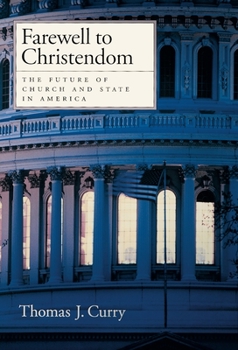Farewell to Christendom: The Future of Church and State in America
Select Format
Select Condition 
Book Overview
Thomas Curry argues that discussion and interpretation of the First Amendment have reached a point of deep crisis. Historical scholarship dealing with the background and interpretation of the Amendment are at an impasse, and judicial interpretation is in a state of disarray. Here, Curry provides a new paradigm for the understanding and exploration of religious liberty, contending that much of the present confusion can be traced to habits of mind that persist from Christendom and inevitably draw government into religious matters. The First Amendment, however, was meant to be a departure from the thinking that had preceded it for nearly fifteen hundred years. Curry traces much of the current difficulty to the largely unexamined assumption on the part of judges and scholars that the amendment created a right--the right to free exercise of religion--and that the courts are the guardians of that right. The First Amendment is, in fact, a limitation on government and a guarantee that the government will not impinge on the religious liberty that citizens already possess by natural right. Here, Curry shows that the key to finding more coherence between Church-State decisions and the historical meaning and purpose of the First Amendment lies in embracing this understanding of the Amendment as a limitation on government.
Format:Hardcover
Language:English
ISBN:0195145690
ISBN13:9780195145694
Release Date:October 2001
Publisher:Oxford University Press
Length:160 Pages
Weight:1.85 lbs.
Dimensions:0.7" x 6.3" x 9.5"
Customer Reviews
2 ratings
A Much Needed and Timely Little Volme
Published by Thriftbooks.com User , 23 years ago
Clear, concise, and deeply thoughtful analysis of the basic premise underlying the religion clauses of the Bill of Rights and how they have been and continue to be misconstrued by both sides in issues involving relations between Church and State. Tracks development of Jefferson's "wall of separation" comment from its original significance to the status of useful shibboleth. Provides insightful interpretation of events that gradually changed what had been "the Protestant nation" into a truly religiously plural society and turned James Madison's concept into reality.Presents a clear and historically accurate picture of the relationship between government and religion envisaged by the Framers of the Constitution, as well as examples of how it can be adhered to in our time.
A Challenging New Book on Church-State Relations
Published by Thriftbooks.com User , 23 years ago
For some time we have not had a truly radical approach to the reading of the First Amendment as it relates to Church-State Relations. Now Thomas Curry, the Roman Catholic Auxiliary Bishop of Santa Barbara, CA, has provided one that I believe will stimulate productive discussions from all sides.Whereas people have largely divided themselves into "separationists" or "accommodationists," a general literalism of approach has blocked our seeing the historical roots of the First Amendment. Those who framed and passed the Amendment did not think like modern Americans, either those who wish for governmental support or those who would put a wall of separation between religion and government.Read carefully, and seen in the context of writers like Jame Madison and the experience of the colonies, the Amendment actually declares that the government has no power in questions of religion. It declares itself incapable of judging religious questions. The founders did not want to support any religion as had been the case with governments of many stripes in the past. Neither did they wish to have a say on what religion was the best or what religion could do. Goernment simply had no competence in religious matters.All religions, not just Roman Catholicism, will be affected by an understanding and acceptance of Curry's views. Freedom for Jehovah's Witnesses, Jews, Muslims--for all religions--is what the First Amendment guarantees for Amricans.





